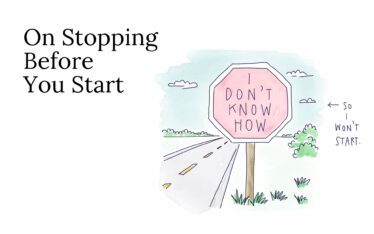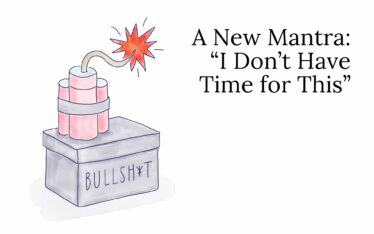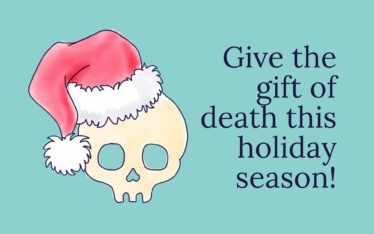We had to put our little Ralphie cat down last week and I feel like I’ve been shot by a rifle. No, wait — a cannon — that’s a far more accurate metaphor. Cannonballs leave way bigger holes than piddly little rifle pellets, and the point I’m trying to make is that there’s a cavernous hole of loss inside me that’s all jagged around the edges and sure to leave a wildly disfiguring scar.
I was going to ask you to not make fun of me for being so grief-stricken over a cat, and then I realized I’m not the only one who has mourned a pet with such a heavy heart.
Seventy percent of U.S. households, or about 90.5 million families, own a pet: dogs, cats, iguanas, you name it. This means that millions of households are forced to say goodbye to Rover, Mittens, and well, whatever you call an iguana (Iggy?), each year.
Research has shown that pets can function as family members. Family members, however, can be assholes, whereas pets are (almost entirely and without exception) devoted, innocent, wide-eyed creatures who just want to give and receive more unconditional love.
Check out these “we like pets better than people” stats:
- Almost three quarters of married survey respondents indicated that they greet their pets before their spouses, and if stranded on a desert island, more than half of those surveyed said they would choose pets over people for company.
- All but one study participant said their pets were “never critical” of them. In contrast, 65% of the participants reported that the human beings in their household were sometimes or often critical of them. (Um, how can you tell if your animal is critical of you? Cats look pissed off 89% of the time.)
- Another poll found that 65% of cats and 39% of dogs slept on a family member’s bed. 63% of dog owners and 58% of cat owners gave their pets Christmas presents.
- Other research has shown that some people make sacrifices for their pets as they might for a human family member. In one survey, nearly half of the respondents stated they “often stay[ed] at home because of their pets.” Another sacrifice that people with pets made was that, despite orders from their physicians, 80% of people with pet allergies refused to give up their pets.
- “If your whole family were in a boat, and the boat tipped over, who would you grab [rescue] first?” A study subgroup of 16 participants were asked this question, and 7 people, including 4 who lived with a partner or child, chose to rescue their pet first. (You read that right.) Three said it would depend who was in the boat.
- In another forced-choice question about choosing who would get a drug that was in short supply, the same 16 study participants were told that someone they would never know would have to do without the drug. Participants were free to interpret what kind of drug it was. Thirteen of the 16 participants said there was at least one circumstance in which they would give a scarce drug to their pet in preference to a person. Half of the 16 participants said that they would always give their pet a scarce drug in preference to a stranger.
Pets make us happier, according to science.
As any pet parent knows well, living with “animal companions” (what they call our furry/ scaly children in research speak) is associated with human health benefits. Owning a pet (especially a dog) has been linked to greater survival after a heart attack. Even looking at an animal while under stress can reduce anxiety (explaining why one of my clients watches a few minutes of animal videos after dealing with her jerky boss… to stay relatively sane).
There is an enormous amount of research on how pets are fabulous for our well-being, and if I’m being honest with you, it was boring me to tears as I was looking it up (and I’m looking to be done with tears after shedding so many). I really wanted to know what happens when a pet dies? (I mean, what happens to us, not whether the little guys go to animal heaven or hover over us like pet ghosts or whatever [but you can bet we had that eerie conversation anyways — and came to zero conclusions].)
Grieving a pet… is it like grieving for grandma?
(If you loved your grandma, then mostly.)
Losing a pet involves what is sometimes called disenfranchised grief, because it’s less socially supported than when a family member passes away, for example. We get bereavement leave from work, discounted plane tickets, and flowery “With Deepest Sympathy” cards in the mail when grandma dies, but not so much when Buddy the Golden Retriever bites the biscuit. We usually have to suck it up buttercup and dial in for the 4pm status update zoom call anyways, adjusting the lighting in vain to hide our swollen, red eyes.
Disenfranchised grief also involves the dismissive words of wisdom from jackasses others to “just get another cat/ dog/ parakeet!” We might, in time, get another cat/ dog/ parakeet. But there is still a bond with the pet we just lost, and an acknowledgment of it feels essential. (Would we ever tell a grieving widow to “just get another husband!” at the funeral? No! We’d wait for the reception afterwards.)
I’ve written about grief before (here), and I’m sure we’re all up on the five stages of loss for human beings (Denial, Anger, Bargaining, Depression, and Acceptance). I was amused to find that researchers have developed pet bereavement models — although I was less amused by the way their stage model played out. See if you can figure out why:
Stage 1: Guilt (“I feel horrible that we put Ralphie down. I also feel bad that I can’t say the e-u-t-h-a-n-a-s-i-a word out loud.”)
Stage 2: Anger (“Why did he have to come down with ANOTHER disease? Why couldn’t the vet fix him?”)
Stage 3: Denial (“Is this really happening? Ralphie will still sleep by our feet tonight, right?”)
Stage 4: Depression (“Blaaaaaaaaaaaaaaahhhhhhhhh.”)
So, um, do you notice anything missing from this list, that’s on the original Kubler-Ross model of human bereavement? And no, I’m not talking about bargaining. WHERE THE HELL IS ACCEPTANCE? We’ll just let that question sit in the ether.
(In case you’re ever interested, there is a Pet Bereavement Questionnaire to help identify how messed up you are from the death of your very own companion animal.)
The death of a pet reawakens our other losses.
It’s not a coincidence that The Husband and I reminisced about our dead mothers on our drive home from the animal hospital. Fresh feelings of loss rekindle dormant feelings of loss, it seems.
Losing Ralphie made me contemplate the very thing I preach for a living, that we should regularly reflect on our impermanence. It’s easier to practice memento mori in the safe confines of hypotheticals, though. It’s downright heart-wrenching to ponder the cycle of life when a life you cherished is no longer around, rubbing up against your ankles and sleeping behind your head on the couch.
It’s a fascinating thing, this experience of being temporarily alive and living with others who are also temporarily alive. We live and love, and we lose. Every single thing we love will leave us (or we will leave them first) — and I don’t mean on the 4:40 train to Houston — I mean for good. We know we will outlive the pets we welcome into our families, and yet we willingly adopt new ones… because we’ve done the math and the equation works out every time:
joy of watching cats play with battery-operated fish > anguish when they die
Getting used to the impermanence of everything around us sounds sorrowful (and let’s be clear: unequivocally shitty) and yet it’s also like a muscle that can be developed. Maybe our angelic little animals help us practice the art of letting go. Maybe Ralphie’s departure can help me treasure all the other things in my life that aren’t dead yet: like Andy (our other feline son), like The Husband, like my Dad.
One day soon I’ll see the existential silver lining on this dark gray cloud, but for now I’m just going to wallow a bit more and indulge my disenfranchised grief. Ralphie, R.I.P., our dear sweet boy.







